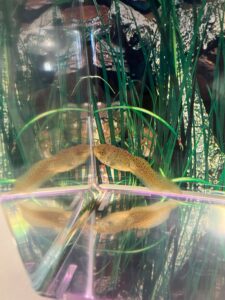Tadpoles at the NC Cooperative Extension Office
go.ncsu.edu/readext?927342
en Español / em Português
El inglés es el idioma de control de esta página. En la medida en que haya algún conflicto entre la traducción al inglés y la traducción, el inglés prevalece.
Al hacer clic en el enlace de traducción se activa un servicio de traducción gratuito para convertir la página al español. Al igual que con cualquier traducción por Internet, la conversión no es sensible al contexto y puede que no traduzca el texto en su significado original. NC State Extension no garantiza la exactitud del texto traducido. Por favor, tenga en cuenta que algunas aplicaciones y/o servicios pueden no funcionar como se espera cuando se traducen.
Português
Inglês é o idioma de controle desta página. Na medida que haja algum conflito entre o texto original em Inglês e a tradução, o Inglês prevalece.
Ao clicar no link de tradução, um serviço gratuito de tradução será ativado para converter a página para o Português. Como em qualquer tradução pela internet, a conversão não é sensivel ao contexto e pode não ocorrer a tradução para o significado orginal. O serviço de Extensão da Carolina do Norte (NC State Extension) não garante a exatidão do texto traduzido. Por favor, observe que algumas funções ou serviços podem não funcionar como esperado após a tradução.
English
English is the controlling language of this page. To the extent there is any conflict between the English text and the translation, English controls.
Clicking on the translation link activates a free translation service to convert the page to Spanish. As with any Internet translation, the conversion is not context-sensitive and may not translate the text to its original meaning. NC State Extension does not guarantee the accuracy of the translated text. Please note that some applications and/or services may not function as expected when translated.
Collapse ▲New Hanover County 4-H is demoing a potential School Enrichment Program this spring. Stop by the New Hanover County Arboretum and N.C. Cooperative Extension Center in the administration building to meet our two Leopard Frog tadpoles!
Their names were voted on my our New Hanover County 4-H members and the winning names are Meadow and Poly because Leopard frogs are also known as Meadow Frogs and Polly is short for Polywog which is another name for tadpoles. This species of frog takes several months to metamorphosis and every visit they may look a bit different.

Not only does this project show the wonders of metamorphosis, but also helps us learn about the importance of taking care of the environments where these animals are found! Amphibians like Leopard Frogs all across North Carolina have an important role as Indicator Species. Indicator Species are very sensitive to various factors that show the health of an ecosystem. If we notice a decline in the health of Amphibians in an area, it indicates that the health of the entire environment is in decline.
There are some things you can do to help frogs and keep your local water sources clean!
- Use native plants and compost in your garden to reduce the need for harmful chemicals that could become runoff.
- Follow the 3 R’s Reduce, Reuse, Recycle, in that order
- Pick up after your pet’s waste, this will help keep the water in out ponds and streams clean and free from harmful bacteria.
Visit Our New Hanover County 4-H School Enrichment Page to keep up with the latest updates on School Enrichment Programs.
To learn more about New Hanover County 4-H, contact N.C. Cooperative Extension,New Hanover County Center/4-Hat 910-798-7675, email Elizabeth_stratton@ncsu.edu or visit our website and like us on Facebook at New Hanover County 4-H or stop by to see us at 6206 Oleander Drive, Wilmington, NC.




